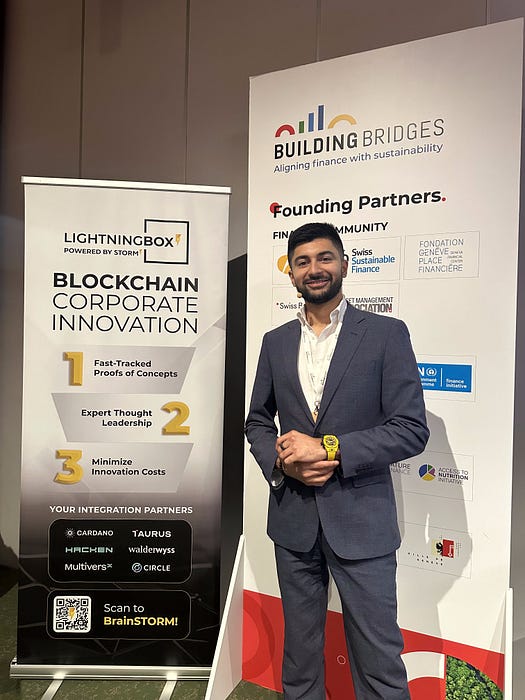
Building Bridges: The Role of Blockchain in Driving Sustainable Innovation in Banking and Beyond


Building Bridges 2024, developed by the United Nations and Lombard Odier, once again proved to be a pivotal platform for fostering critical conversations at the intersection of finance, technology, and sustainability.
This year, STORM Partners proudly took center stage by hosting and curating the event’s only blockchain-focused panel: “Blockchain: The Key to Green Banking.”
Moderated by Sheraz Ahmed, Managing Partner at STORM Partners, the panel brought together leading industry experts to share their insights and experiences.

The engaging discussion explored how blockchain technology is shaping the future of sustainable finance and green banking.
Our esteemed panelists included:
- Milko Hensel, Team Head TechBanking, Maerki Baumann & Co. AG
- Aliya Das Gupta, SVP Business Development, Sygnum Bank
- Paul Bureau, Digital Assets Director, Delubac & Cie
- Christopher Fabian, Co-Founder & Co-Lead, Giga (UNICEF-ITU)
- Felix Simon, Sr. Sales Manager Digital Assets, Incore

Together, they explored how blockchain can redefine the intersection of finance, technology, and impact.
Blockchain as an Enabler of Green and Inclusive Finance
The conversation began with a challenge to traditional narratives: can blockchain truly create a positive impact in the banking sector and beyond? Panelists dispelled myths, focusing on real-world use cases demonstrating blockchain’s ability to drive efficiency, transparency, and inclusivity.
Aliya Das Gupta highlighted tokenization’s power to democratize finance. She cited Sygnum Bank’s partnership with Hamilton Lane to tokenize a traditionally exclusive money market fund. By lowering the minimum investment threshold from CHF 125’000 to 1'000, Sygnum opened the doors to a broader investor base, showcasing blockchain’s potential to reduce barriers to wealth creation.

Paul Bureau emphasized blockchain’s capacity to enhance Environmental, Social, and Governance (ESG) compliance. He proposed a decentralized, immutable system for reporting ESG data, reducing costs and increasing accountability. Such a system could dismantle barriers to data access, enabling innovative financial products and fostering trust.

Driving Transparency Through Immutable Data
Transparency is a cornerstone of sustainable finance. Christopher Fabian demonstrated this with Giga, a UNICEF-ITU backed initiative leveraging blockchain to connect schools in underserved regions. Giga’s blockchain-based data system records real-time connectivity metrics from over 150,000 schools, ensuring accuracy and accountability. By transforming these metrics into tradable connectivity credits, Giga is unlocking new financing avenues for local service providers while addressing the global digital divide.

Felix Simon and Milko Hensel underscored the necessity of reliable data for ESG-aligned investments. Blockchain’s traceability ensures that reported data — whether emissions figures or financial transactions — is trustworthy. This transparency empowers investors to make informed decisions, aligning their portfolios with sustainability goals.

Overcoming Challenges: Regulation and Integration
Panelists acknowledged the challenges of integrating blockchain into traditional banking systems. Felix Simon described Switzerland’s early adoption of regulatory frameworks like the DLT Act, which enabled innovation while maintaining compliance. Collaboration with regulators, clients, and technology partners has been pivotal in transitioning from proof-of-concept to scalable, impactful solutions.
Aliya Das Gupta addressed the duality of blockchain adoption: balancing legacy infrastructure with the pursuit of innovation. While traditional systems remain cumbersome, blockchain offers a pathway to streamlined operations and reduced administrative overhead, reinforcing its value proposition.

The Quantum Question: A Future of Opportunities and Risks
A key topic was the potential threat of quantum computing to blockchain’s cryptographic security. Panelists reassured the audience that while quantum advancements are years away, the industry is proactively developing quantum-resistant encryption protocols. Sheraz Ahmed pointed out that blockchain’s security measures are already more robust than those in many traditional systems, ensuring resilience against emerging threats.
The Path Ahead: Blockchain for Global Impact
From decentralized finance to sustainable development, blockchain is poised to revolutionize industries. Paul Bureau envisioned a future where blockchain’s efficiency and transparency eliminate bias, fostering equitable access to opportunities. Christopher Fabian echoed this sentiment, emphasizing the role of blockchain in transforming data into actionable insights for global good.

In closing, the panelists agreed that blockchain’s journey is just beginning. Its potential to bridge gaps — between traditional and digital finance, developed and emerging markets, and environmental and economic goals — makes it a pivotal technology for the future.

This event illuminated blockchain’s transformative potential in creating a more transparent, inclusive, and sustainable financial ecosystem. As challenges are addressed and adoption grows, blockchain is not just a technology but a catalyst for meaningful change.



.svg)

.svg)


